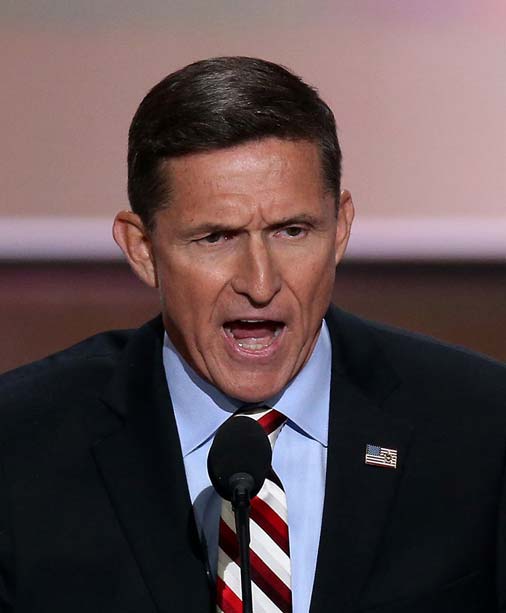 Bloomberg photo by David Paul Morris
Bloomberg photo by David Paul Morris
Implementing President-elect Donald Trump's "vision . . . of making America great again," Flynn said, would be achieved "overwhelmingly" through a policy of "peace through strength."
But in his first extensive public remarks since the election - an address to a U.S. Institute of Peace conference on "Passing the Baton" - Flynn largely flew above specifics, with no mention of individual countries or planned policies. His goal, one Trump transition team official said, was "not to make news," and he largely succeeded.
Unlike Trump, and Flynn himself on many occasions, he offered no direct criticism of the Obama administration. The closest he came was noting that the American people, "faced with some of the darkest days of civil and foreign wars, economic depression . . . weak leadership at home and hostile threats abroad," have "always retained their faith in the American experiment . . . the greatest model for liberty the world has ever known."
Before the election, when he advised Trump on national security issues, Flynn repeatedly charged that Obama and Hillary Clinton, as secretary of state, were weak and dishonest in combating and explaining to the American people the threat posed by what he and Trump defined as "radical Islamic extremism."
Like Trump, Flynn has been accused of an unhealthy closeness to Russia and President Vladimir Putin, at whose side he sat at a gala dinner in Moscow in 2015. But unlike Trump, Flynn has also sharply criticized Russia, accusing Moscow of forming an "enemy alliance" with Iran and questioning its provocative military actions on its western border.
Appointed by Obama as head of the Defense Intelligence Agency after a distinguished career in military intelligence, Flynn, a three-star general now retired from the Army, was pushed to resign after two years because of what administration officials said was a bad management style. Flynn has acknowledged that he clashed with Obama officials but attributed mutual dissatisfaction to the White House's refusal to acknowledge the extent and definition of the extremist threat.
Speaking Tuesday about the U.S. role in the world, Flynn said that "America might have its ups and downs, but the assumption has long been that America would always be there . . . reliable, strong, present and ready. We have always been the indispensable nation, and we always will be."
While he spoke of reexamining U.S. global partnerships, Flynn also said that "alliances are one of the great tools that we have, and the strength of those alliances magnify our own strengths."
His remarks appeared aimed at reassuring European and other allies, concerned by Trump's campaign comments disparaging NATO and calling on all partners to begin paying more for the U.S. defense umbrella.
He began his speech by complimenting the current national security adviser, Susan Rice, who preceded him with remarks of her own.
Rice, he said, after the two shook hands on stage and smiled for the cameras, had spoken with "a grace, a dignity, an elegance and a commitment to this country that goes beyond some of our wildest imaginations." Sacrifices made by Rice and former Clinton administration secretary of state Madeleine Albright, who also spoke, "transcend who we are," Flynn said, calling for extra rounds of applause for both.
While he has a "reputation as a bull in a China shop," Flynn "spoke in tones . . . respectful and complimentary," said Jon Alterman of the Center for Strategic and International Studies. In terms of substance, Alterman observed from the audience, Flynn "intentionally didn't say anything."
In her own address, Rice listed what she described as the Obama administration's foreign policy successes, praising the president's successful efforts to "get our economic house in order" as a crucial precursor to national security.
Even as he was revitalizing the economy, Rice said, Obama "wound down wars in Afghanistan and Iraq, . . . averted the prospect of a dangerous and costly new war" with the Iran nuclear agreement, "put in place a sustainable counterterrorism strategy," negotiated groundbreaking nonproliferation and climate agreements, provided humanitarian aid, and fought Ebola and AIDS.
While praising Obama's "rebalance" of attention and military resources toward Asia, Rice said that "failure to move forward" on the Trans-Pacific Partnership trade deal - which Trump has said is dead in the water - would erode U.S. leadership in the region, "with China standing to gain strategically and economically."
Rice said that she has had "constructive" meetings with Flynn since the election. "This was a tough and hard-fought election," she said, "but our national security is and must always remain above the fray."
Speaking at the conference earlier Tuesday, Secretary of State John Kerry said he had not yet met with his nominated successor, Rex Tillerson. In less conciliatory terms, Kerry said he worried that the new administration, among other things, would "turn away from" important foreign aid and other initiatives around the world and warned of the danger of an "America first" policy.
"What worries me the most is that I won't be there," Kerry said, quickly insisting that he was "just joking."


 Contact The Editor
Contact The Editor
 Articles By This Author
Articles By This Author